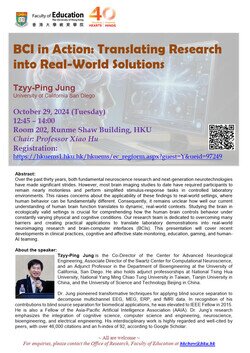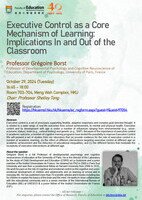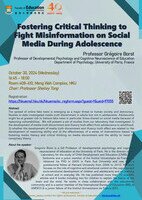Seminar: BCI in Action: Translating Research into Real-World Solutions
Seminar
Date
October 29, 2024 (Tue)
Venue
Time
12:45 PM - 2:00 PM
Speaker

BCI in Action: Translating Research into Real-World Solutions
Tzyy-Ping Jung
University of California San Diego
October 29, 2024 (Tuesday)
12:45 – 14:00
Room 202, Runme Shaw Building, HKU
Chair: Professor Xiao Hu
Registration:https://hkuems1.hku.hk/hkuems/ec_regform.aspx?guest=Y&ueid=97249
Abstract:
Over the past thirty years, both fundamental neuroscience research and next-generation neurotechnologies have made significant strides. However, most brain imaging studies to date have required participants to remain nearly motionless and perform simplified stimulus-response tasks in controlled laboratory environments. This raises concerns about the applicability of these findings to real-world settings, where human behavior can be fundamentally different. Consequently, it remains unclear how well our current understanding of human brain function translates to dynamic, real-world contexts. Studying the brain in ecologically valid settings is crucial for comprehending how the human brain controls behavior under constantly varying physical and cognitive conditions. Our research team is dedicated to overcoming many barriers and creating practical applications to translate laboratory demonstrations into real-world neuroimaging research and brain-computer interfaces (BCIs). This presentation will cover recent developments in clinical practices, cognitive and affective state monitoring, education, gaming, and human-AI teaming.
About the speaker:
Tzyy-Ping Jung is the Co-Director of the Center for Advanced Neurological Engineering, Associate Director of the Swartz Center for Computational Neuroscience, and an Adjunct Professor in the Department of Bioengineering at the University of California, San Diego. He also holds adjunct professorships at National Tsing Hua University, National Yang Ming Chiao Tung University in Taiwan, Tianjin University in China, and the University of Science and Technology Beijing in China.
Dr. Jung pioneered transformative techniques for applying blind source separation to decompose multichannel EEG, MEG, ERP, and fMRI data. In recognition of his contributions to blind source separation for biomedical applications, he was elevated to IEEE Fellow in 2015. He is also a Fellow of the Asia-Pacific Artificial Intelligence Association (AAIA). Dr. Jung’s research emphasizes the integration of cognitive science, computer science and engineering, neuroscience, bioengineering, and electrical engineering. His interdisciplinary work is highly regarded and well-cited by peers, with over 46,000 citations and an h-index of 92, according to Google Scholar.
~ All are welcome ~



![[40th Anniversary Seminar Series] <br/> AI is developing at a phenomenal speed. <br/> What is AI literacy and how can it be learnt? Poster](/f/event/52180/142c200/Poster_Oct2024.png)